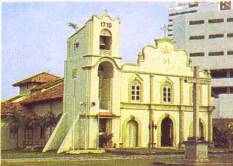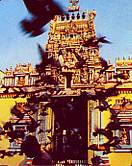|
A variety of religions found in Malaysia is a direct reflection of the diversity of races in Malaysia. Islam is the national religion, but freedom of religion is guaranteed. Malays are usually Muslims. The Chinese are predominately Taoists and Buddhists, though some are Christians. The majority of Malaysia's Indian population are mainly Hindu and originate from southern India, though a sizable percentage are also Muslims and Christians. They are also Sikhs, mainly in peninsular Malaysia. Many indigenous people of east Malaysia have converted to Christianity although others still follow their animist traditions.
|
| Malaysia's official language is Bahasa Malaysia, or Bahasa Melayu. You can also get along quite happily with English throughout Malaysia. English is, along with the Bahasa Melayu, the linking language between the various ethnic groups. Other everyday languages include Chinese dialects such as Cantonese, Hakka, or Hokkien. |
|
The Indians also speak Tamil, Malayalam, Hindi, or other Indian languages.
I
t is reasonable to say that the Malays control the government while the Chinese have their fingers on the economic sector of Malaysia.
Malaysian music is heavily influenced by Chinese and Islamic forms. Music is based largely around the Gendang (drum), but includes percussion instruments some of which are made of shells, flutes, trumpets and gongs. Malaysia has a strong tradition of dance and drama, with Thai, Indian and Portuguese influences. Other artistic forms include Wayang Kulit also called shadow-puppets, Silat which is a stylized martial art, and crafts such as batik, weaving, silversmithing and brassware.
| The convergence of cultures within Malaysia is rooted in the golden era of the Malacca sultanate which attracted merchants from far regions of the world such as: China, India, the Middle East and Europe. Intermarriage of Malays with Chinese and others sprang the Baba-Nonya and Chetty communities as well as the Portuguese Eurasian community. The British, in their bid to exploit the rubber and tin industry in Malaysia brought in workers from India and China. They all brought with them the cultures of their motherlands. Mutual tolerance, acceptance and celebration of each other's cultures embodies the essence of Malaysia. |
| Guidelines on the Do's & Don'ts |
| Please take off your shoes when entering a place of worship or a Malaysian home. When in the presence of a dignitary, officials or elders, it is impolite to cross your legs with the sole of your shoes facing the person. If you are hosting a meal and your guests include Muslims, avoid liquor and dishes which contain pork. If your guest is an Indian Hindu, avoid serving him beef. Shaking hands is acceptable, but kissing of the hand or cheek should be avoided. Many Muslim women, especially those who cover their heads, prefer not to shake hands with members of the opposite sex. In such a situation, a simple nod and smile is sufficient. Malaysians generally respect their elders and will not confront, antagonise or openly disagree with them. Visitors are expected to be modestly dressed especially in the conservative rural areas of the country. It is considered impolite for guests to wear shorts to a place of worship or a function, except to a beach party. But then, as with most things, times are changing, some for the better and some for the worst. Its best to use one's judgment according to the situation and place and listen to the locals. |
Getting There

Discover Malaysia States of Malaysia History Monarch Government History People Culture Festivals Holidays Handicrafts Cuisine Weather FAQ
|
|





